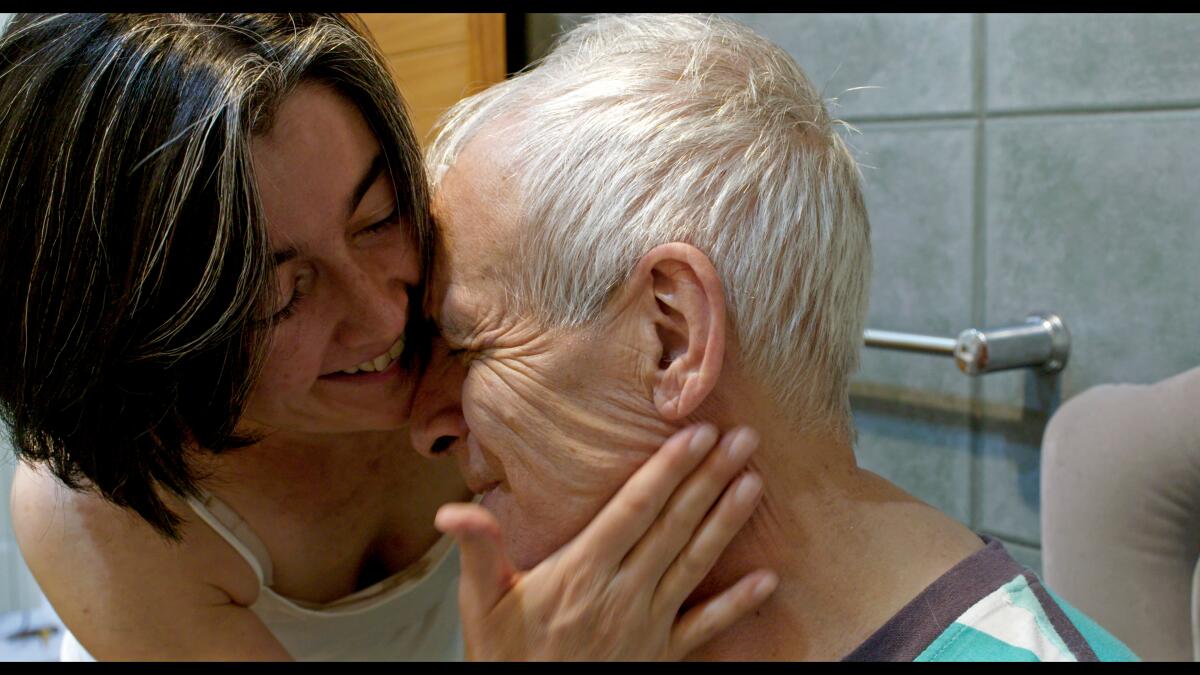Chilean doc Eternal Memory reminds true love endures even after recollections fade

- Share via
Augusto Góngora couldn’t remember how long he and Paulina Urrutia had been together, nor the exact chronology of their shared years. Yet, what he never forgot was how much he loved her. That sentiment remained untainted despite his battle with Alzheimer’s disease.
Therein lies the heartsore luminosity of Chilean director Maite Alberdi’s Oscar-nominated documentary “The Eternal Memory,” which chronicles their unconditional adoration for one another amid his illness. The cosmic irony of Góngora’s condition, Alberdi initially thought, is that for decades he acted as a keeper of the country’s historical memory.
As a journalist during the atrocious Pinochet dictatorship, Góngora was behind clandestine newscasts and later, when democracy returned, he produced cultural programs for public television. Urrutia, on the other hand, is an accomplished actor with credits on stage and screen and the former minister of the National Council of Culture and the Arts of Chile.
Alberdi had long admired their respective careers, but after Góngora publicly revealed details about his deteriorating health, the filmmaker witnessed how Urrutia would bring him around other people as part of her theater rehearsals, rather than isolating him.

“It immediately caught my attention because it was the first time that I saw a person with dementia so integrated into the world and I felt that this was the way to understand caring for someone,” Alberdi said of her initial interest. “I saw a very lovingly active relationship.”
Without hesitation, Góngora agreed to Alberdi’s proposition to make a documentary. He defended the project to Urrutia, who was understandably more hesitant about exposing their intimacy. His rationale boiled down to honoring the people who had trusted and shown their pain to his camera. How could he not agree to show his own fragility now?
The first two years, Alberdi recalled, were about gradually seeing how comfortable her subjects felt filming and about building trust. That both Góngora and Urrutia were used to being in front of the camera given their professions facilitated that process.
When the COVID-19 pandemic prevented Alberdi from physically visiting the couple, she sent Urrutia a camera.
Although Alberdi had taught Urrutia how to use the cameras, most of what the actor filmed was out of focus. Despite the lack of technical proficiency, the scenes were poignant, which served as a lesson to the director “that the most important thing is the emotion.”
“That’s how the story became a choral piece because it features footage from Augusto’s camera from 20 years ago, as well as mine and Paulina’s,” noted Alberdi. “It’s the three of us taking different fragments of time to build a common relationship.”
Alberdi shot for four and a half years, not knowing how the doc would end. Then one day, as they were shooting, Góngora looked at Urrutia and said, “I’m not myself anymore.”
“That day was the first time I felt uncomfortable filming because he felt uncomfortable with himself. Before that, even though he had Alzheimer’s, it seemed that he felt his identity and I also saw it very present,” said Alberdi. “The loss of identity was the limit for me.”
For Alberdi, “The Eternal Memory” is as much about this enduring romance as it is about Chile’s past. Through the making of her heartbreaking dual portrait, Alberdi realized that Góngora had not forgotten everything he investigated, but he could only recall it viscerally.
“He was unable to tell you what year the dictatorship started, but he could narrate his painful memories of what happened until the last day,” said Alberdi. “And what that tells you is that there is a historical emotional memory that remains when time passes, no matter how much the dates or specific events are forgotten.”
Alberdi believes this notion is crucial to fight the far-right ideologies that have emerged in Chile, and around the world, 50 years after the coup d’état that put Pinochet in power.
These reactionary forces can try to manipulate or erase the facts — practicing historical denialism and reinterpreting human rights violations — but they will never be able to erase the indelible pain of the country.
In retrospect, Urrutia is now grateful that Góngora, who died in 2023, made up his mind and convinced her to make the movie. Talking about him has helped her grieving process.
“She thought their story was very local, but then realized that it was not the story of a country, but rather it was the story of a love and a story of memories,” Alberdi said.
More to Read
From the Oscars to the Emmys.
Get the Envelope newsletter for exclusive awards season coverage, behind-the-scenes stories from the Envelope podcast and columnist Glenn Whipp’s must-read analysis.
You may occasionally receive promotional content from the Los Angeles Times.






